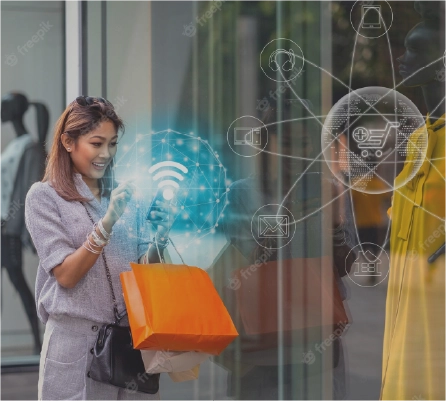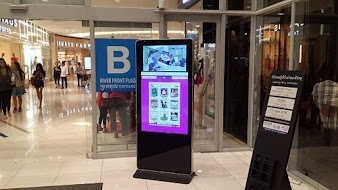Project Management
AI – Reinventing the Malls for Better Customer Experience
- Surya Vamsi
- May 21, 2021

“Shopping Malls have seen little to no change in their format over the past 30 years. However, with the new digital wave ushered in with AI and AR, we are seeing more malls adopting digital technologies. They are now able to provide shoppers relevant information about their shopping options, discounts and offers as well as new trending products either on their mobile phones or kiosks to enhance their customer experience. These recommendations are now intelligent, personalized and directed with the power of AI. Shoppers are also able to use AR to find interesting things about a shop by simply pointing their cameras at the relevant shop. They can also find all shopping options by talking to a concierge on their mobile phone or at a kiosk. All these digital transformations are shifting the paradigm of how Malls operate and how they remain relevant and competitive”
AnanthaKrishnan Gopal – CTO and Co-founder , DaveAI
Customers review and retrospect a lot of potential factors before inclining towards a brand. To ensure the long-term retainment and constant engagement of the clients, it is imperative for the businesses to meet up with their expectations. With continuously upgrading technology and comforts, it is no surprise that the curve of customer experience expectations is constantly rising. To catch up with these trends, shopping malls are incorporating Predictive analytics as well as AI into their business to understand, predict and strategize the logistics & sales in order to ensure customer satisfaction & retention. Whenever a customer purchases a product, they transit through a lot of phases, starting from evaluation to the final purchase. Shopping malls and stores create various segments to leverage on the funnel created for every single customer to enhance the customer experience. The incorporation of AI and deep learning into this structure can help enhance the customer experience. For example, various online stores as well as kiosk facilities in the shopping malls offer recommended products assisted by machine learning and big data.
A report by McKinsey states that when predictive analysis and deep learning are incorporated into sales, the average profits of a company are expected to rise to around 126%. Going by similar trends, malls are intensely incorporating similar techniques into their functioning.
With the unending use cases and updates in the existing technology, malls have infinite possibilities to integrate these advantages into their functioning. However, a few of the malls and stores have already started leveraging these advantages to generate better customer experience through the following ways-
Kiosks
Ever since Amazon started toying around with kiosks in a few stores in 2019, almost a countless number of malls have kiosks set up now, to allow seamless navigation of the store for the customer. Various malls and brands like Inorbit Mall, SUGAR, DLF Promenade, and other metro malls have kiosks stationed in their key areas. Kiosks leverage on factors like specific product recommendations through interaction with the leads about their requirements, query resolution regarding the features or other aspects of the product, and minimization of staff interaction to allow productive input of time.
Virtual And Augmented World
The advent of augmented and virtual reality in brick-and-mortar stores has recouped a majority of the crowd who resorted to online shopping. Right from virtual mirrors to virtually augmented dressing rooms, customers can now explore the thrill of AI in shopping malls.
Instead of waiting in hour-long queues to try out an outfit, customers can now simply check the fit and structure with a few clicks on the Virtual Smart Mirror. Various market giants like H&M, Burberry, etc, have already installed virtual mirrors in their shopping malls to entice customers with the undying prospects of AI.
Analysis of Customer Value
Various formulas can be employed to calculate the lifetime value of customers. The results obtained can be used to segregate customers into long-term and one-time engagement. While short-term or one-time purchase clients serve their needs, it only makes sense to employ the resources in a well-defined way to retain long-term clients. The stores and malls can integrate on these databases to adjust their service and marketing efforts targeted to these long-term clients.
Inventory Management
Based on the purchasing patterns and frequency of customers, predictive analysis can calculate inventory requirements to make sure the supply is always in par to meet the present market demand. This lets the malls stay equipped with the inventory for months to keep up with the rush. Machine Learning can also be used to predict future purchase decisions of customers from their previous buying patterns.
Timed Promotions
One of the key factors employed in retaining customers is the timely promotion of the latest products in stock. Data Analytics helps malls and stores to figure out the most responsive and receptive time to shoot out the campaign, thereby ensuring proper customer engagement. This information, coupled with logistic fluctuations can help the stores generate sales the right way, at the right time.
Omni Channel Fulfillment
With the amalgamation of both online and offline stores, online retailers are partnering with stores to share with them a part of the revenue, to enable pick-up from the store. These stores allow online retailers to mark-up the price, thereby enabling mutual profit. According to a recent survey by invespcro, around 67% of shoppers in the U.S. already use ‘Buy Online Pick-up’ in-store services. Furthermore, a survey from business insider has predicted the following percentage increases in the number of U.S. customers preferring BOPIS.
Handling Bulk Customers
With immediate access to advanced commutation methods facilitated through smart mobiles, every shopping store is experiencing an enormous bulk of customers at any given instant. The influx is too much to handle through human efforts without any additional assistance. This is where AI has been a blessing to these ever-busy malls and stores. Machines can structure and analyze large amounts of data simultaneously input into them and are then able to predict the action of the customers in an instant.
Price Optimization
One factor almost every customer reviews before purchasing a product is the price. Optimizing price needs to consider a lot of factors like the customer-friendly approach, profit of the store, manufacturing costs, supply chains, stocks, etc. Analyzing these essentials for each and every product catalog is not only a demanding activity but also time-consuming. AI on the other hand can use self-framed algorithms to analyze the same and suggest an optimized price satisfying all the constraints set forth. This not only optimizes the profit but also ensures a better value in terms of customer experience.
Anticipating Supply Chain Artificial Intelligence can run algorithms to figure out potential failures in the machinery and the software, warning immediate resolution to keep up the smooth flow of the Supply Chain. This coupled with blockchain can help gain transparency throughout the process.
Loyalty Programs
According to a statement by Datafloq, around 71% of respondents who are shippers and third-party logistics believe that the quality of information improves the operations of the store, further proving the statement that customer loyalty can be increased with predictive analysis and machine learning.
The segmented customer cycles created through data analysis can be reviewed to completely personalize the incentives offered to the customer. Contrary to providing the same rewards and benefits to all customers, stores, and malls are employing Deep learning algorithms to personally reach out to customers with the apt incentives and loyalty programs to attract them. A few renowned businesses like Marriot International are also deploying to incentivize customers through channels like Slack and Facebook Messenger.
AI overtaking almost every link of the chain from supply to sale is a fact to be invited considering its huge potential to automate tasks and improve overall efficiency With AI being the new companion, brands and malls can not only maintain a varied catalog of the products, but can also provide the customers exactly what they need.
Email Newsletter
get updates & more

